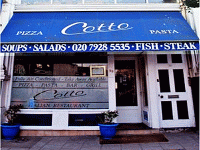IDEAS FROM YOUR PEERS
Allergies, intolerances and dietary requirements - is your business getting it right?

Having already heard from the larger operators about their work in these areas,BigHospitality has spoken to a smaller, family-run business in Waterloo along with a number of industry experts; to explore the different ways your business could offer more for customers with specific requirements, and the various potential benefits that being allergy-friendly could bring.
The idea...Cotto Italian restaurant in Westminster Bridge Road prides itself on 'catering for every allergy'. Every morning, the business makes its own range of pizza, pasta, bread and gnocchi which is gluten-free, lactose-free and wheat-free. It has a full coeliac menu with over 40 gluten-free dishes along with a separate vegetarian menu featuring extensive nutritional and dietary information.
The restaurant also holds specific training for its kitchen staff from 3pm to 5pm every day, to keep them in good practice and improve their skills preparing dishes for particular dietary requirements and their knowledge of contamination issues.
Why is it so important?
"Because of me," said Lino Boccia - Cotto's director, who does everything at the restaurant from waiting tables to cooking in the kitchen. "When I was a young man, I was suffering a lot. Twenty-three years ago, on Christmas Eve, I fell really ill after having dinner and a I found out that I was allergic to gluten. It now actually seems to be running in the family, but I was just the first to find out.
"So it’s about passion. If you don’t know what it’s like to actually suffer from these things, you probably won’t have the passion. I was brought up in this business to care for people – me and my wife have lots of children and we care about others. That’s where it all starts.
"With the daily staff training that I do, the team here really understands the meaning of allergies and food intolerances – contamination is very, very aggressive. You can be in trouble in a second if you get things wrong, which is why we are so careful and why we’ve had no problems since opening (in March 2001)."
What are the benefits?
“For one, it makes us really stand out from our competitors at the moment,” added Boccia. “The larger restaurant companies don’t seem to be as fussy with things, they tend to just do everything in the same kitchen and staff awareness can sometimes be an issue.
“And now that we have that differentiator, our care for customers with allergies and food intolerances has really allowed us to build up a loyal customer following. We ask for feedback on meals we’ve created especially for them; giving them an incentive to come back again.
“By making all of these customers feel welcome, we massively increase our reach and I think that shows with the bookings we receive, so it certainly brings us some tangible benefits.”
The experts' view:
Caroline Cooper, founder of Zeal Coaching, which helps to give hospitality clients a ‘ competitive edge’, said: "You're missing out on huge opportunities if you don't make any provision to cater for the huge numbers that have some kind of allergy or intolerance. Not only those individual customers, but the whole party they're with will probably end up going somewhere else.
Guy Holmes, managing director of Captivate Hospitality consultants, added: "In most cases, restaurants and pubs can cater for food intolerances with minimal effort and cost. They just need a greater understanding of food intolerances as well as the ingredients that go in every dish. So it’s really a win-win situation as it boosts sales, as well as your brand image - and it doesn't really cost anything."
Top tips...
- Start with the basics - "Review your existing menu," said Cooper of Zeal Coaching. "You may be surprised to identify a number of dishes already on your menu that will meet certain dietary requirements such as those with no dairy produce, or wheat. Also, check pre-prepared ingredients, especially sauces and condiments, for any 'rogue' ingredients.
- Don't be complaicent - Holmes of Captivate Hospitality, added: "It has to be done properly. The last thing you want is to promote special dishes, then due to poor training the ingredients that are supposed to be omitted, end up in a dish. In extreme cases you could be sued. So do your research, get a specialist consultant in if necessary to advise on the menu and train staff.
- Train your staff - "Ensure everyone in the business is aware of all the options on the menu which are suitable for specific diet requirements," said Cooper. "If any of your staff have first-hand experience, like Boccia from Cotto restaurant, enlist them as your dietary champion."
- Shout about it - Holmes concluded: "Advocating what you do for those with intolerances, allergies and dietary requirements will almost certainly help with your brand image as it reinforces the high levels of customer service, as well as giving you the edge over the competition. It's also a great way to build loyalty with customers.
















